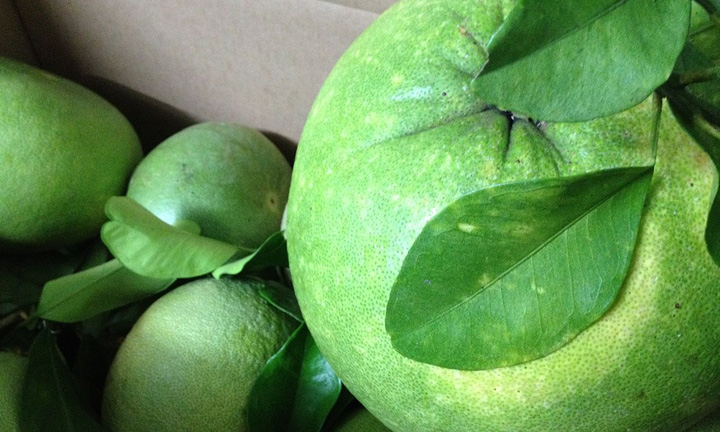Source: Matt Brann, ABC Rural
It has been a tough few years for one of Australia’s biggest pomelo farms, but better times are hopefully just around the corner.
Since an outbreak of citrus canker in the Northern Territory in 2018, citrus producers near Darwin have had to comply with a number of biosecurity requirements to sell their fruit interstate.
Speaking to ABC Rural while his pomelos were checked by biosecurity staff, grower Han Shiong Siah said even though canker had not been found on his farm, the measures had affected his business “dramatically”.
“To get our fruit to market there’s a bunch of additional protocols, including treatments in the field, post-harvest treatments in the packing shed such as a chlorine dip, as well as inspections of 600 fruit per shipment,” he said.
“We’re doing this so we can get market access; we understand this is important, but we don’t want to do this for the rest of our lives.
“Hopefully they don’t find citrus canker from now on and will deem the NT free of canker so we can go back to normal.”
Drop in yields adding to the problem
The Siah family has been growing pomelos — the world’s largest citrus fruit — since the 1980s and normally produce 20 to 25 tonnes per season.
This year, however, the family farm produced just eight tonnes.
Mr Siah said adverse weather conditions played a role but the biosecurity requirement to spray his plantation with a copper-based fungicide had really impacted yields.
“It’s a significant drop, but it’s still some cash back in our pockets and better than having zero tonnes,” he said.
“The consumers are enjoying them, they’re buying them, and they’re selling out every time they arrive [in the markets], which is good.”
Mr Siah’s last consignment of pomelos for the season was trucked to Sydney. He hopes by next season the citrus canker restrictions will be lifted.
When will the NT be declared free of canker?
Biosecurity officer Dave Morley said citrus producers in the Territory would hopefully enjoy area-of-freedom status by the end of the year.
Since 2018, Mr Morley’s team has been a familiar sight on Top End farms as they go about inspecting properties for signs of citrus canker.
“Today, we’re here inspecting 600 items of the fruit going into the consignment. We’re looking for signs of canker, and that’s a requirement of our interstate partners that’s been negotiated to allow fruit to move interstate,” he said.
“We’ve put a lot of resources into this to ensure growers can trade interstate as best as they can, so we’ve got the team here and we’re here to support industry.”
He said farm inspections were happening at least once a week.
“Over the last three months we’ve inspected about 8,600 pieces of fruit and around 33,000 kaffir lime leaves,” he said.
“We’re on track by December 2020 to achieve proof-of-freedom [for citrus canker], that’s what the response plan states and at the moment we’re on track for that well and truly.”
The last citrus canker detection in the Territory was on lime plant in the Darwin suburb of Karama last June.
Western Australia was declared free of citrus canker in November, 18 months after the initial detection of infected plants in the East Kimberley. The infected plants originated from a nursery in the NT.
The citrus canker hotline is 1800 931 722 or the public can email photos to citruscanker@nt.gov.au.

